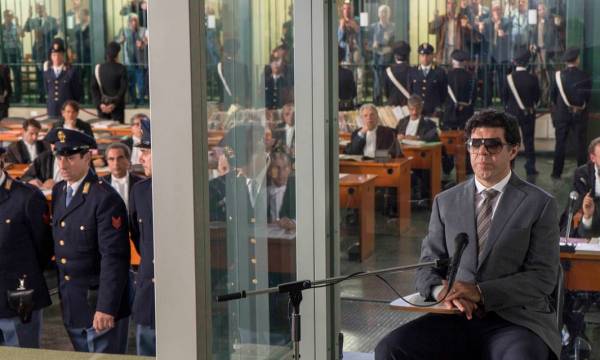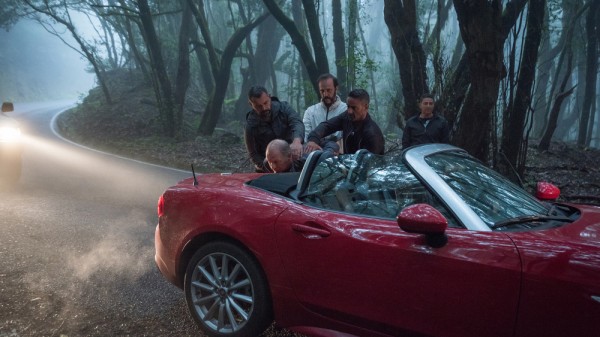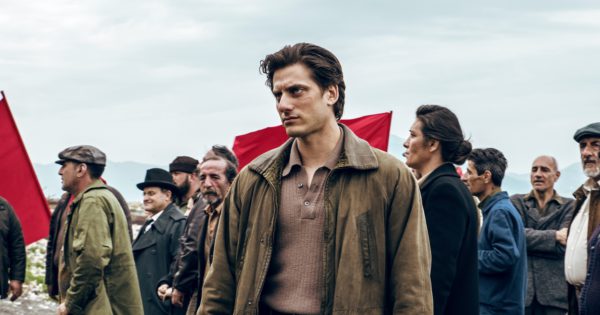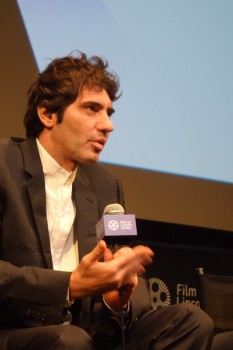-
SIBYL (Justine Triet 2019)
JUSTINE TRIET: SIBYL (2019)

VIRGINIE EFIRA IN SIBYL
An embarrassment of riches
Sibyl is a disappointment after Victoria, Triet's highly amusing previous film with the same star, Virginie Efira. I was surprised to find people consider Sibyl a comedy. It's more like an account of how a woman in recovery from alcoholism returns to drinking, and why: is that a funny subject?
Too much is going on here, and it's hard to know how to take it. There's a good basic topic (if this can be said to have one): a psychiatrist who steals from a patient's life to turn it into successful fiction. A simpler, more conventional treatment of this could have been interesting enough. But Triet and cowriter Arthur Harari pile on the complexity and obscure this theme. On top of that there's a surreal back-and-forth-flashback-montage editing technique of very short clips (a bad new fad) that's pretentious and adds confusion.
Sibyl (Efira) was a bestselling author but a painful breakup with her former boyfriend Gabriel (Niels Schneider), with whom she has a child, led her to quit writing and turn to psychotherapy (go figure). She is happy now (it would seem) with a new man, Etienne (Paul Hamy) by whom she has had another child, a little girl. She is going to meetings to conrol her alcoholism and isn't drinking. (Just wait.) Of course she goes on seeing her own shrink too.
She has a younger sister, Laure Calamy (from the Netflix French TV hit Call My Agent), who appears several times, most notably to give the little girl a quick lesson in emotional manipulation: she tells her mother she "lacks the tools to deal with life." An amusing, but gratuitous, moment.
As the film begins - but it is full of flashbacks to the affair with Gabriel, including a gratuitous full-on sex scene (eschewed in Victoria) - Sibyl can no longer resist the temptation to go back to writing and to that end is dismissing her patients. There is a crudely comic scene of a patient royally pissed off at this. Tellingly, he says he has given her his whole life. Soon we will learn that she's quite likely to use it.
At least she does when she takes on a new patient who forces herself upon her for an emergency. She is Margot Vasilis (Adèle Exarchopoulos, in full hysteria mode), an actress on contract for a film to be made on and around the island of Stromboli (evidently a homage to the 1950 Bergman-Rossilini film). She is pregnant by her costar, Igor Moleski (Gaspard Ulliel), but he's involved with the film's German director, Mika Saunders (Sandra Hüller of Toni Edrmann). The emergency is that she can't decide whether to have the baby or not, and she can't bear to tell Igor she's pregnant.
Sibyl is never any discernible help in this matter, and Margot goes back and forth. Meanwhile Sibyl - who has none of the qualities of the wisdom of that name, or even any moral compass - is furiously writing a manuscript based on Margot's sessions, and presumably other stuff cribbed from people's lives. As time goes on, publishers turn out to be very pleased with the results. She's also having play-therapy sessions with a little boy grieving for his dead mother. (These seem gratuitous, and not that interesting, but that goes for much of the material that crowds this over-stuffed film.) Flashbacks frantically depict intense encounters between Sibyl and the handsome Niels Schneider.
Soon - and here is when we enter into farcical territory, though it seemed heavy-handed to me - Sibyl winds up with the film crew on Stromboli, because Margot is even more confused and desperate, but the filmmaking must go on, so she, Sibyl, is called in to hep Margot function. But due to the emotional complications with Igor, Margot, and Mika, Mika also is nearing a meltdown, her directing becoming ever more neurotic and extreme. (I couldn't help wondering if the way Mika's directing is handled might make future actors hesitate to take on Triet as a director.)
In a series of heavy-handed filmmaking sequences, Sibyl emerges for a while as the only competent person around, except perhaps for Igor, who mostly holds his temper. (This is a long-suffering and selfless role for Gaspard Ulliel and one of his most unflattering.)
In a way Victoria was a wild, disorderly mess too, with Efira in a ditsy but sexy role. A hilariously absurd courtroom sequence toward the end, the charm and suavity of the great Melvil Poupaud, and the sweetness of Vincent Lacoste as a babysitter enamored of Efira, make that movie charming and fun. That doesn't happen here.
Eventually the responsibility - or the succession of inappropriate roles, not to mention the inappropriate behavior in assuming them, all the while breaking all the rules of medical ethics - causes Sibyl to meltdown, and her return to alcoholism is spectacular. It's also embarrassing, clumsily staged, and profoundly unfunny. While I sided with French critics on Victoria against the Anglo ones who trashed it, this time I have to agree with the Anglos, and hope that Triet will have more success with her material in her next feature.
Sibyl, 100 mins., debuted in Belgium and France May 24 and the same day at at Cannes, Justine Triet's first film in Competition there. It played in four other festivals including Toronto and New York, screened at the latter for this review, Oct. 5, 2019. AlloCiné press rating 3.7 (butI Victoria was 3.8, La bataille de Solférino 4.0), Metascore (same as for Victoria) 57%.


JUSTINE TRIET AT NYFF Q&A [CK photos]
Last edited by Chris Knipp; 01-09-2020 at 05:34 PM.
-
THE TRAITOR/IL TRADITORE (Marco Bellocchio 2019)
MARCO BELLOCCHIO: THE TRAITOR/IL TRADITORE (2019)

PIERFRANCESCO FAVINO AS TOMMASO BUSCETTA IN THE TRAITOR
For the Italians, a national epic; for us, a sprawling gangster movie with a weird trial sequence
Marco Belloccio's The Traitor seeks to depict the real life of Sicilian gangster Tommaso Buscetta, the so-called "boss of the two worlds." He is important because he was the first major mafia informant in Italy in the 1980's. The movie dramatizes with mind-blowing accuracy Bruscetta's trial as "il primo grade pentito di Mafia," the first high ranking Mafioso "penitent one" or state's witness, or traditore, ("traitor") in the eyes of the Cosa Nostra. This film is very highly regarded in Italy (see Paolo Casella in MyMovies or Federico Girone in ComingSoon, two big Italian movie sites) and was in Competition at Cannes. Anglophone critics have found it impressive in scope, but in some ways underwhelming. To us it seems somewhat bogged down from the start by an over-abundance of detail, such as a long initial sequence of horrific, loud, violent moments showing assassinations, accompanied by a roll call of flowery Italian names.
Because this is different, more "documentary," though not in the least lacking in the elements of gangster grand opera, The Traitor may seem, to Anglos, ultimately lacking in the flair of the director's other works, such as his muted, haunting 2003 Aldo Moro kidnapping drama Good Morning, Night or his energetic and beautiful fascist biopic Vincere (NYFF 2009). And this is not to mention possible overshadowing by the famous early career-making Belloccio films of the Sixties, Fists in the Pocket and China Is Near, the latter celebrated by Pauline Kael as "one of the most astonishing directorial debuts in the history of movies."
The Traitor covers twenty years, skipping most of Bruscetta's early career as a Mafia princeling. It falls into sections, dominated by its make-or-break testimony and trail segment. After the assassinations sequence shows off Cosa Nostra violence, we see Bruscetta move to Brazil, to get away from that and to run crime operations in Rio with his family and Brazilian wife. He leaves behind his two adult sons, one of whom is a heroin addict; it's a decision he regrets after they are both killed by his enemies. But in Brazil he is arrested and tortured. A flashy scene shows him in one helicopter and his wife dangling from another as the cops try to loosen him up by threatening to drop her.
He goes back to Italy and reluctantly, more to save his family than out of any "repentance" (and he rejects all titles for what he's doing), he begins testifying to Judge Giovanni Falcone (Fausto Russo Alesi). This happens in a series of private sessions and is the film's key relationship. Pierfrancesco Favino, the longtime character actor who plays Bruscetta with enigmatic grandeur, made a point in the NYFF Q&A of repeatedly insisting (in his excellent English) that Falcone is the hero of this story, not Bruscetta; that the men of the Cosa Nostra are evil, stupid fellows. Bruscetta himself hereafter cherishes his relationship with Falcone - whose courage in pursuing this case will lead later to his death in an explosion in a car (duly depicted). In time Bruscetta is given a roommate in his spacious prison accommodations, Totuccio Contorno (an excellent, low-keyed Luigi Lo Cascio), another high-ranking mafioso joining the ranks of pentiti.
Next, after Bruscetta is provided with his choice of tailored suits (with a chance meeting at the tailor's with the soon-to-be-tried "Il Divo" Giulio Andreotti), comes the trial. This is what makes The Traitor special. It seems to a non-Italian operatic, chaotic, absurd: but it not only follows transcripts and extensive films of the events, but was able to be shot in the actual huge courtroom where the trial took place. The "cross-examinations" where mafiosi abuse and accuse each other are wild, crazy macho stuff. Bruscetta, this first time (he will return from witness protection later for a repeat performance), is in a glass cage in the middle, while lesser prisoners are in metal cages along the side.
After this, which results in the sentencing of hundreds of mafiosi, Bruscetta joins his family in the US, in witness protection in various locations from Florida to New England to Colorado. This is interesting too, for its detail, the taste of danger he always felt, though, we learn, he died in his bed as he had wanted, at 71 - but this is also anti-climactic, the stuff of documentary, not of drama.
For Italians we have to remember the story of Tommaso Bruscetta is a great national epic, some kind of partial rite of purification from a long, dark past. For us the movie is more of a mixed bag, with too many digressions to make well-structured drama. The craft and the acting are impeccable, though, and often impressive.
Another important point noted by Bellocchio in his NYFF Q&A (speaking in crystal-clear Italian) but lost to anglophone-only viewers, is that much of the dialogue of the film is in Sicilian dialect that is subtitled in Italian when the film is shown in Italy. He can't understand Sicilian himself. Most Italians can't. This important alienation effect is lost for the US audience, since the Sicilian dialogue simply gets the same English subtitles as the Italian. Bruscetta tries to elevate himself by speaking a mixture of Sicilian and Italian (with some Portuguese, which he speaks always with his wife), but Contorno repeatedly points out that he cannot speak Italian. Awareness of this might help us understand a little better that Cosa Nostra is an alien empire, a strange and powerful cancer on the Italian state.
The Traitor/Il traditore, 145 mins., debuted in competition at Cannes with simultaneous Italian release; nine other festivals listed including Toronto and New York, screened at the latter for this review. Bought by Sony it's scheduled for US release Jan. 31, 2020. Current Metascore based on eight reviews: 57%. Highly regarded in Italy. Released in France Oct. 30, with an AlloCiné press rating of 4.3, equivalent to 86%.
Last edited by Chris Knipp; 01-21-2020 at 08:33 PM.
-
BEANPOLE (Kantemir Balagov 2019)
KANTEMIR BALAGOV: BEANPOLE/Дылда (2019

VIKTORIA MIRONSHNICHENKO IN BEANPOLE
Vibrant grimness
Kantemir Balagov is only 27 years old and this is his second feature; Jessica Kiang calls him in her Variety review a "blazing" talent. This is a long, agonizing study of two battle-scarred young woman working in a hospital in Leningrad, and those around them, just after the end of the War, showing how Russia and its people were ravaged then. The titular figure is Iya (Viktoria Mironshnichenko), whose height, pallor, and strange nervous and muscular condition got her that nickname.
The glowing look and the closeup intensity reminded me at first of Hungarian Laszlo Nemes' amazing debut feature Son of Saul (FCS/NYFF 2015). Balagov fools you, showing you a gallery of hopeless cases but then seeming to focus on cheer and life with Beanpolel's relationship to a cute little boy, then he delivers a rude shock. The plot is a tangled web of associations, manipulations, and disappointments. But if I understood Balagov correctly, the movie grows wholly out of his fascination with a book he discovered about PTSD among Russian woman after WWII, The Unwomanly Face of War by Svetlana Alexievich.
From early on, the action is almost too much to bear and too hard to watch. Yet all the characters, played by non-actors, are vivid, and the images glow with yellows and ochres. The cinematography by Ksenia Sereda is great. As ugly and depressing as the events are, they look beautiful, and the director's youthful enthusiasm makes this contradiction seem not cynical but right. This is a film about youth - youth sabotaged. The rickety, minimal trappings - long trolley cars, ornate but ancient automobiles - still seem very alive, if, like the people, likely to collapse and die at any moment. One old but elegant vehicle is driven by Sasha (Igor Shirokov), who comes one night looking for fun, and his hilariously clumsy frolic with Iya's friend Masha (Vasilisa Perelygina) leads to a tenacious connection. He is homely but he turns out to be rich. He can woo Masha with fruit, salt, and other goodies she shares with Beanpole.
I didn't altogether buy into the action, even though I remained open to being astonished. It's all too much, and the main characters are too fluid. When Shasha takes Masha to meet his mother in a grand house, it's a typically jaw-dropping sequence, an opening up of the action that typically soon closes down. Like everything, it all feels improvised, but in some ways all the more real for that. I salute this wunderkind's remarkable talent and invention.
Balagov hit the Russia film scene by surprise only two years ago with his debut feature, Closeness, which also unexpectedly made it into Un Certain Regard at Cannes, where it won the FIPRESCI Prize. At the time even Russians hadn’t heard of the young director, a disciple of the great Alexander Sokurov, whom he gave a nod to in his NYFF introduction of the film as "my teacher." A great deal may be understood by exploring this connection, but obviously Galagov has made what he learned from Sokurov his own as any master pupil does. It seems beyond the point to say this is one to watch. This is a brilliant, unforgettable film.
Beanpole/Дылда (Dylda), 130 mins., debuted in Un Certain Regard at Cannes May 2019, winning its Best Director award. Seven other festivals followed, including Toronto and New York, screened at the latter for this review. US theatrical release is planned for Jan. 29, 2020. Current Metascore 81%.
[Some of my information is drawn from this site: Russian Beyond.]
Last edited by Chris Knipp; 10-21-2019 at 01:37 AM.
-
THE WHISTLERS/GOMERA (Corneliu Porumboiu 2019)
CORNELIU PORUMBOIU: THE WHISTLERS/GOMERA (2019)

STILL FROM THE WHISTLERS
The trappings of a crime caper don't make for much entertainment
Corneliu Porumboiu is one of the most admired of the new generation of Romanian directors, whose Police, Adjective I reviewed in the 2009 NYFF, and his The Treasure in the 2015 one. He has his admirers, no doubt. I am not particularly one of them, and even less so after this latest effort.
Porumboiu provides the trappings of a unique crime story here with an unusual Canary Islands setting, but it's all tongue in cheek, and kind of by-the-numbers, so it's not fun and ultimately makes little sense. If conceptual genre flicks are your thing, go for it. Otherwise, stay away from The Whistlers.
"Corneliu Porumboiu's deadpan, daffy noir has a cop caught in a labyrinthine plot involving women, whistling and a mattress full of money" says Jessica Kiang, in her Variety review. Reviewing this film for the Guardian at Cannes, Peter Bradshaw calls it a "elegant and stylishly crafted piece of entertainment," with "a nifty plot" that is "quite involved" but "hangs together well."
There are however essential things missing from the start in this film and they are never supplied: what is this all about, and what are these different players' parts in it? There are mattresses full of cash, yes: where did the cash come from? Cristi (Vlad Ivanov), the stolid, corrupt cop who's the main focus throughout is involved in this business. But what is the business? How did he get involved in it?
Instead of providing details of the crime or personal touches about the characters, Porumooiu gets involved in motifs and peculiar local color. There is a hotel called "Opera" where the proprietor, who's in on the crime, constantly plays opera, on vinyl, loud in the reception area. He has a particular penchant for the Barcarolle from Offenbach's Tales of Hoffman. (This gets old after a while.) Most of all, Porumboiu has discovered Gomera, in the Canary Islands, where a code language to communicate with whistles is part of the local culture, and actually taught. Cristi gets lessons and eventually he is able to communicate this way across a considerable distance to the lovely Gilda (Catrinel Marlon). (Why if this is the local culture it's claimed that police would think the whistling was bird calls is unclear. I guess not on Gomera.)
I enjoyed the tightly organized edit of the film, the flashy cars, the pretty if repetitious music, and the beautiful Catrinel Marion. There is a dazzling music-and-lights show at an Asian entertainment park that's used for the final sequence. It's pretty. But it was impossible to enjoy or even understand the rest of the film.
The Whistlers/Gomera, 97 mins., debuted at Cannes in Competition and was scheduled for 13 other festivals including New York, where it was screened for this review Oct. 7, 2019. Metascore 74%.

CORNELIU PORUMBOIU AT NYFF Q&A [CK photo]
Last edited by Chris Knipp; 10-14-2019 at 11:10 AM.
-
MARTIN EDEN (Pietro Marcello 2019)
PIETRO MARCELLO: MARTIN EDEN (2019)

LUCA MARINELLI (CENTER) IN MARTIN EDEN
Jack London translated into Italian
This is director Pietro Marcello's half-terrific, half-off-putting Italian adaptation, with previous collaborator Maruizio Braucci, of the 1909 American novel by Jack London about a proletarian intellectual who decides to become a writer despite lack of education and is troubled by an upperclass girlfriend, becoming too successful too soon, then despairing. Though there was a 1942 film with Glenn Ford in the lead, the book is well known in Europe but now largely forgotten at home. In America London's dwindling fame rests on his north woods tales and he seems like a YA writer; I had no idea he had this philosophical side.
Pietro Marcello's movie is intermittently engaging, and grabs you from the start, thanks to the charisma and intensity of the rangy Italian star, Luca Marinelli, who proclaims his lines and stares out at us with his big blue eyes. Because Eden is a seaman the protagonist's home base has been shifted to Naples, and despite some lingering American names, Marcello has thoroughly Italianized this material.
Some of Marcello's avant-garde methods can be a bit distracting as we go along. Chief among these is indifference to what era of the twentieth century the action is taking place in, a freedom with period detail he doesn't handle with the same convincing panache as Derek Jarman. An initially intriguing use of edited archival footage also comes to seem distracting and arbitrary, though it's nice that he prefers film and worked with 16mm., and the use of archival footage is something he is particularly wedded too.
It's also true that the character of Martin Eden becomes increasingly shrill and unsympathetic, but that is intended and part of the Jack London novel. This is not meant as a stirring intellectual bildingsroman so much as a disturbing cautionary tale, though that isn't clear until later. It's astonishing when Martin, pushed by his provocative older friend Russ Brissenden (Carlo Cecchi), addresses a socialist rally and attacks their ideology with nihilistic declarations, declaring socialism a "slave mentality." Later at an author lecture he simply sounds crazy. He gets out of control and starts to turn ugly.
As Lee Marshall writes in a Screen Daily review, Marcello is best known for his "unclassifiable arthouse documentaries" that "hover" between "reality" and "a cinematic fugue state." I found this a bit hard to take in the one previous film of his I'd seen, his 2015 Lost and Beautiful/Bella e perduta (ND/NF 2016). He has gone much more mainstream here, and with a bigger budget, though he ultimately makes no concessions to conventionality. Martin Eden is innately a strong, accessible story. We're grabbed by the protagonist's naive passion, his discovery of poetry and books through Elena Orsini (Jessica Cressy), the upperclass girl he meets through rescuing her little brother from a bully. The sympathy will dwindle rapidly later on.
It turns out that in the terms of Italian education, Martin is so lacking in general information that he needs to go back to primary school, which he's too poor to do, even if he could face the humiliation. Conventional education just isn't what he wants. He simply reads and reads and writes and writes and sends his stories and poems to magazines, which all come back marked "return to sender" - until one doesn't, he's paid an enormous 200,000 lire, and the tide turns toward wealth and fame.
The relationship with Elena is ambiguous. It stands for Eden's ambiguous relationship toward class, conventionality, maybe even toward life. She pledges her undying love, but wants Martin to let her father set him up in some kind of office job. Instead when he needs money he goes to the sea, or takes brutal work on a foundry, and he gets into fights. When he becomes known, and turns into an ideologue, expounding the brutal Darwinian theories of Herbert Spenser, Elena rejects him. Eventually he seems also to reject himself - and when she comes back, he rejects her too.
There is something grand but flawed about Eden as played by Marinelli, grand and flawed also about this film. Pietro Marcello's boldness and freedom engage at first, even with the random found footage and the mixing of 1900's clothes and modern cars. Something grand and revolutionary seems afoot, as with Martin Eden himself: one can see how this filmmaker, with his glut of ideas and penchant for breaking genre barriers, would like this class-hopping anti-hero who breaks all the rules and succeeds - till he crashes. Eden's half-cracked plunge into ideology seems cool for a while. It's something so rare in American movies.
Eden's transformation into a rich, spoiled, self-absorbed superstar author happens too fast, especially given how well the film has depicted some of the proletarian settings, Eden's naivete, his affection for the little family he lives with in the suburbs, his speaking of Neapolitan dialect whenever required. (As with Bellocchio's The Traitor, English subtitles fail to reveal the constant shifts from Italian to dialect to the Anglophone audience.) Suddenly Marinelli has bleached hair combed differently, he lives in a grand house, and he wears fussy collars and neckties. It doesn't really compute. Pietro Marcello's plunge into more conventional storytelling is promising but he might do better to pare down some of his avant-garde methods. This is a memorable if flawed experiment.
Martin Eden, 129 mins., debuted at Venice, where Marinelli won the Best Actor prize. It's in seven other listed festivals, including Toronto, New York, and London, and it was screened for this review as part of the NYFF (Oct. 7, 2019). The film received many wards and nominations at Rome. Metascore 57% (when this review was written, which seemed extreme; it's better than that; now at US release time, Oct. 2020, it's grown to 73%). US release date: Oct. 16, 2020.
A Toronto Q&A with the director HERE.

PIETRO MARCELLO AT NYFF Q&A [CK photo]
Last edited by Chris Knipp; 01-01-2021 at 07:08 PM.
-
SATURDAY FICTION 兰心大剧院 (Lou Ye 2019)
LOU YE: SATURDAY FICTION 兰心大剧院 (2019)

GONG LI IN ISATURDAY FICTION
Exploded atmosphere
Lou Ye's elaborate new black-and-white spy film, a showcase for the still glamorous and beautiful Gong LI set in Shanghai in the week before the December 7, 1941 bombing of Pearl Harbor, is glamorous and atmospheric. One revels in the rainy streets, the big heavy black cars, the men and women dressed to the nines, the public rooms and suites of the elegant "Cathay Hotel" and a puzzling theater stage that seems like a dance hall perpetually in motion.
If I told you that I never quite understood exactly what was going on, that might not differentiate this movie from Casablanca or The Big Sleep. But something is lacking in the characterizations and the dialogue that those classics have. When it is all over and more than two hours have passed, there has been a lot of mystery and finally a lot of noise and blood, but there is not much satisfaction.
The action takes place in the cosmopolitan "French Concession," a place apart in the "solitary island" that the city of Shanghai has been since it was occupied by Japan in 1937 and a privileged neutral zone. Here, Jean Yu (Gong Li, as a famous actress, not a stretch) has come to join Tan Na (Mark Chao), the lead actor and director, in a play, to be staged at Shanghai's Lyceum Theatre, and they are former lovers. This much is clear.
But the scene in which they first meet here blurs the line between reality and theater, and it keeps getting repeated. I never quite understood why. (It almost seems the director of the film has mistakenly left in alternate takes, an effect that's intriguing, but also distracting.) The action begins in murkiness. And while there are continually moments in the light as various characters, French, German, Japanese, and Chinese, come and go, that murkiness continues and floods our perception of the proceedings. We are trapped in ongoing rehearsals, interrupted by double-crosses, surprised by furtive sendings of encrypted messages, and stunned by fatal shootouts. And yet the murkiness triumphs.
Toward the end, the on screen audience assembles for the play, entitled, yes, Saturday Fiction. But Jean Yu cannot perform because she is in too much danger. Her role is taken, temporarily, by Bai (Huang Xiangli), a reporter, spy operative, and acting hopeful who has infiltrated herself early on into Jean Yu's life. Switcheroos and multiple roles are the essence of this piece.
Jean Yu, who's been in Hong Kong a while, is ceremonially greeted as she arrives in the French Concession by the Cathay Hotel's manager Saul Speyer (Tom Wlaschiha of "Game of Thrones"). He turns out to be spying for the Allies, and will report also on all her activities. She has come not only for the play but to locate her ex-husband, and get him out of the hands of the Japanese, who have captured him. She has been a spy operative herself, hence Saul Speyer's special interest. But she's here also for a third reason. She's been summoned by Frédéric Hubert (Pascal Greggory), a French book dealer who reveals his possession of a rare copy of Sorrows of Young Werther signed not only by the author, Johann Wolfgang von Goethe, but by Friedrich Nietzsche. M. Hubert walks with a cane, but it's just an elegant accoutrement. He's quietly natty dresser who's also a spymaster who has looked over Jean Yu over the years while running her espionage missions for some years.
This is a movie that goes a little too slow for quite a while, until it goes too fast. It steeps itself in rich period atmosphere (though with a few touches that are plainly anachronistic), and lingers over Jean Yu's meetings with various men, and has to take time to introduce us to the puzzling play, the Cathay Hotel's labyrinthine passages, and the cast of characters. The latter include Mo Zhiyin (Wang Chuanjun), the Lyceum's untrustworthy and malicious producer, and importantly, Captain Saburo (Joe Odagiri), a Japanese military intelligence officer who has come to Shanghai to distribute to his operatives the updated Japanese operational codes. These M. Hubert is extremely keen on learning. It so happens that Jean Yu may be able to help him pry them out of Saburo, because she closely resembles his dead wife. (Several people get slipped a sleeping potion that helps unlock their secrets.)
Once all this gets set up, the Japanese come in, violence breaks out, and Jean Yu, in the semi-darkness, becomes a nearly indestructible superhero on the Chinese side, capable of wielding a pistol and an automatic weapon with equal pinpoint accuracy. After the long scenes of dreamy dialogue, I confess I found this sudden turn to violence bewildering. After all, it's Gong Li. All that lovely, if somewhat draggy, atmosphere, exploded, thrown away in a prolonged shootout? It seems modern directors love doing period but lack insight into the genres that go with it. Watch, though, to see what happens to The Sorrows of Young Werther, in a memorable sequence when M. Hubert slips away.
Saturday Fiction 兰心大剧院 (Lyceum Theatre), 125 mins., debuted at Venice Sept. 2019, also in five other festivals including Toronto and New York, screened at the NYFF for this review. Slated for US release by Kino Lorber. Metascore: 51%.
.
Last edited by Chris Knipp; 10-09-2019 at 09:57 AM.
-
ATLANTICS/ATLANTIQUE (Mati Diop 2019)
MATI DIOP: ATLANTICS/ATLANTIQUE (2019)

MAME BINETA SANE, WHO PLAYS ADA IN ATLANTICS
Economic desperation, drowned African refugees, a love story and a ghost story
Atlantics is a refugee drama, transformed into magic and mystery and revenge by possession, that focuses on the women left behind by a group of men suddenly lost at sea when desperation in their work leads them to try to sail to Spain in an open boat. It focuses on a popular suburb of Dakar, poor but vibrant with youth, where workers on a construction site with a futuristic (CGI) tower have striven for months without pay. Among them is Souleiman (Traore), the tall, handsome young lover of Ada (Mame Bineta Sane), who is to marry the well-off Omar (Babacar Sylla) in ten days. A French reviewer called this film "an emotional, visual, and sonorous poem." As the action plays out, the real gives way to dream: the young women take back their power through being possessed by the spirit of their men. The busy trailer for the film uses the tag line DF Wallace's biographer DT Max links to him, "Every love story is a ghost story."
Despite its grand prize, a few French critics found the 36-year-old Diop's film mix of genres lacked mastery; resorted too often to shots of the sea or the full moon. Mike D'Angelo was bothered by the fact that Soleiman possesses the notably fit and young police inspector Issa (Amadou Mbow) instead of Ada and can't agree with Jay Weissberg's interpretation that in his Variety review that this switch is to "avoid any same-sex 'awkwardness' towards the end." Maybe what both writers really object to is resorting to the supernatural to resolve socioeconomic issues in the first place. That is what bothers me - while nonetheless Diap's choice to focus on the bereaved women, partly a practical one, seems justified as a way of examining the tragedy of drowned African refugees.
The main force of the action is that grief is transformed into righteous anger when a group of the women turn milky-eyed at night and go several times to haunt the crooked building project boss, Mr. N’Diaye (Diankou Sembene) and eventually force him to pay them all the lost men's back wages. But there is also the brief return of Soleiman in the body of the fit Issa to make love once with the bereaved Ada. Soleiman's entering the body of Issa is emotional logic, the only kind that prevails here.
This is a film that makes great sense overall but has shortcomings in the details. You can find fault with various plot elements. Another is that though Ada has the conservative friend, Mariama (Mariama Gassama), who berates her for not being nice to her new rich husband she doesn't love, Omar, it would have been better to include severe hijab-wearing friends, and not just fun-loving ones. D'Angelo certainly has a point that Inspector Issa's investigation of the fire of the marriage bed and persecution of Ada is repetitious and inexplicable. The repeated shots of the sea are indeed repetitious, though they do serve as a reminder of its devouring maw and the loss of all the fine young men.
But all this is beside the point in a way because what is enchanting and strong is the way Mati Diap captures the vivacity and physical beauty of the Senegalese people here. This is Africa, and the film shows us what that means. Soleiman is a gorgeous young man, tall, pretty, with the long, loose, forward stride they all have, which conveys a sense of optimism, strength, confidence: you can imagine how they'd think they could sail to Spain in a little open boat. Ada is equally beautiful, slim, supple, forward-striding, charming, coquettish. In their brief afternoon scene when they kiss and long for more, and there is never a goodbye and Soleiman (like all the men) never tells his beloved he is going to sail away, is yet a bright and memorable moment full of sensuality and lost promise.
Likewise all the scenes of the women afterwards glow with color and energy. The action sparkles. The whole film flashes and pops, underlined by Fatima Al Qadiri's music and Claire Mathon's cinematography that is somehow vivid and rough, in-your-face yet pleasing, a palette that's "muted," as Weissberg says, emphasizing the people, and the (bright and often hazy) light. Even the repetitious full moon and sea horizon shots underline the sensual simplicity of the style. The vigor of the young men is so well conveyed in the opening scenes that their temporary survival after death in the night-possessed women feels possible. This is about the beauty of African youth and an energy and strength that can live on after death. Even if Diap's story choices seem alien to you, you can feel that they come from somewhere profound. This is a film bold in its ambition and imagination, so much so it skips over certain details of logic or consistency.
Atlantics/Atlantique, 104 mins., debuted in Competition at Cannes May 16, 2019, and subsequently was awarded the Grand Prix. Mati Diop is the first woman of African descent to have a film showing in Competition at the festival or win an award in its 72 years. The film opened theatrically in Dakar in Aug. Eight other festivals are listed including London, the Hamptons, Chicago and New York. It was screened at the NYFF for this review Oct. 9, 2019. AlloCiné press rating 3.4 from 28 review (though many admired it, a good number of French critics also found it seriously flawed), while the Anglophone critics response was apparently much more glowing, given a Metascore of 81% (based on 14 reviews).
Last edited by Chris Knipp; 10-10-2019 at 11:46 AM.
 Posting Permissions
Posting Permissions
- You may not post new threads
- You may not post replies
- You may not post attachments
- You may not edit your posts
-
Forum Rules







 Reply With Quote
Reply With Quote








Bookmarks